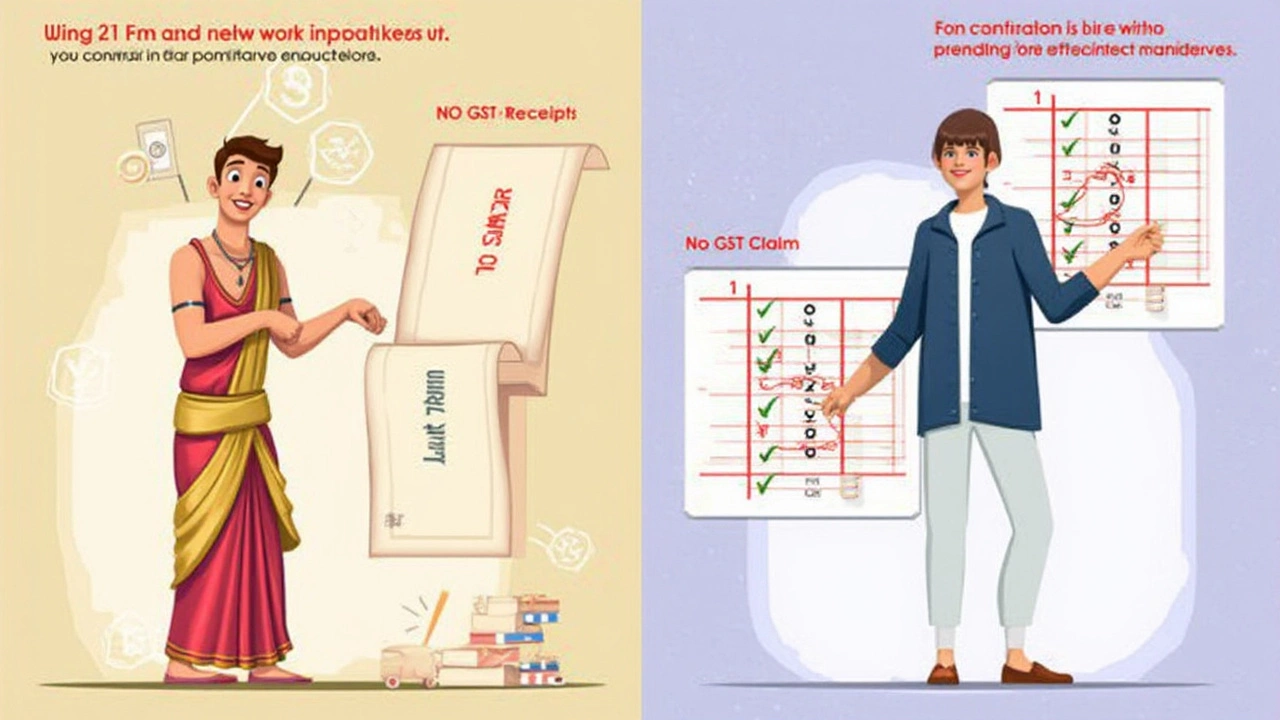Here’s a question that trips up business owners every year: can you actually claim GST for stuff you use personally? The short answer is no—but there’s a bit more to the story. If you mess this up, you can get stuck with audits, fines, or worse. And yes, the tax office checks these things a lot more often than you’d think.
The tricky part is figuring out what counts as personal use versus business use. Bought a laptop for your business, but your kid also uses it for gaming? Suddenly, it’s a grey area. The GST claim only works for purchases tied to your business activities. Mixing things up can lead to big headaches if you get audited. Even if you accidentally slip in a personal item, it’s safer to fix it fast—otherwise, penalties pile up.
- What Is GST and Input Tax Credit?
- GST Claims for Personal vs. Business Use
- Common Mistakes and Audit Triggers
- Tips for Correct GST Filing
What Is GST and Input Tax Credit?
GST stands for Goods and Services Tax. It’s a tax you pay when you buy most products or services in India, including everything from pens to laptops. If you run a business and you’re registered for GST, you charge GST to your customers, collect it, and then pay it to the government. But here’s the good part—you can also claim back the GST you’ve paid on business purchases. This is called claiming input tax credit (ITC).
Simply put, ITC lets you reduce the amount of GST you owe by the GST you’ve already paid while buying things for your business. Doesn’t matter if you’re buying stock, office supplies, or equipment—if it’s for business, you can usually make a claim.
Not everything qualifies for ITC though. The rules are strict. Anything bought for personal use—like that new phone you gave your spouse—shouldn’t be claimed. The government cross-checks this using invoice details, so it’s not worth the risk.
Here’s a quick look at how ITC works on a basic level:
- You buy goods/services for your business and pay GST on those purchases.
- You sell products/services and collect GST from your customers.
- At the time of GST filing, you subtract the GST you’ve paid (input) from the GST you’ve collected (output).
- You pay the difference to the government. If your input GST is more than your output, you can carry the credit forward or get a refund.
To give you an idea of how this plays out, check the table below. It’s a simple snapshot of how GST and ITC stack up for a typical business in a month:
| Transaction Type | Amount (INR) | GST Paid/Collected |
|---|---|---|
| Purchases (for business) | 1,00,000 | 18,000 (input) |
| Sales | 2,00,000 | 36,000 (output) |
| ITC Claimable | - | 18,000 |
| GST Payable | - | 36,000 - 18,000 = 18,000 |
Keep your invoices and records rock-solid—they’re your proof if the tax office comes knocking. Remember, only claim ITC for purchases that are strictly for your business. If there’s any mix with personal use, the claim gets rejected and can land you in trouble.
GST Claims for Personal vs. Business Use
This is where a lot of people get tripped up. As far as the GST law goes, you can only claim GST credits for goods and services that are used in your business. If you buy something and use it for personal purposes, you can’t claim the GST for that portion. Let’s say you buy a new phone for your work but also use it to binge Netflix. You’ll have to split the claim—only the business portion is eligible for a GST credit.
Here’s the exact rule: the input tax credit (ITC) only applies if the goods or services are used in the course of running your business. Anything purely for personal use is out. Even if it’s a mixed-use item, you need to work out a fair business percentage. This isn’t a guesswork thing—the tax office expects a reasonable, honest calculation. Some business owners keep a usage log to track this, especially for stuff like cars and laptops.
The GST rules are clear about what counts as business use, but let’s nail down the details with a quick table. This might save you from making a costly mistake at tax time:
| Item Example | Personal Use GST Claim Allowed? | Business Use GST Claim Allowed? |
|---|---|---|
| Home Office Desk (used only for work) | No | Yes |
| Fuel (50% work, 50% personal) | Only business portion | Yes (for work portion) |
| Family Holiday Flight | No | No |
| Work Uniform | No | Yes |
Can you fudge the numbers and hope for the best? Not a good move. The ATO’s data matching systems have gotten way smarter—according to recent tax office reports, small business GST audits increased by over 30% in 2024. If you’re found claiming GST credits for personal use, you could end up paying back the credits plus extra penalties.
- Keep receipts for everything, and highlight business versus personal items.
- When in doubt, only claim what you can prove relates to your business income.
- Regularly review your claims, especially for mixed-use items. Adjust claims if your business or personal split changes during the year.
Bottom line: Only claim GST on the business part. The easiest way to stay safe? Keep business and personal expenses totally separate, whenever you can. It might feel like a hassle, but it beats an audit and a penalty notice.

Common Mistakes and Audit Triggers
Almost everyone slips up when filing GST at some point. But some mistakes are flagged instantly. The tax office is trained to spot patterns, especially around GST claims for personal or mixed use. Here’s where things usually go sideways.
- Claiming GST on personal expenses: This is the big one. Trying to claim input tax credit on holidays, home supplies, or even a family phone plan sets off alarm bells every time.
- Not splitting mixed-use costs: Bought something for business and home? You can’t claim the full GST, only the business part. If you try claiming all of it, that’s a classic audit trigger.
- Poor documentation: No receipts, missing vendor GSTINs, or invoices with blanks get you noticed. If the tax office calls for backup and you don’t have it, your claim might be denied.
- Claiming ITC on blocked items: The GST law has a list of blocked credits—like club memberships, personal cars, and some insurance premiums. If these show up in your return, red flags go up fast.
Ever wonder how often people get caught? According to a 2024 report by the Indian GST Council, nearly 12% of GST audits in small businesses uncovered wrongful claims related to personal expenses. Here’s how some of those stats stack up:
| Mistake | Percent of Audits Triggered | Average Fine (INR) |
|---|---|---|
| Personal use claims | 39% | 15,000 |
| Missing documents | 27% | 10,500 |
| Blocked credit claimed | 14% | 8,200 |
| Full claim on mixed expenses | 20% | 12,700 |
Want to avoid the spotlight? Always check your gst filing for these key problem areas before submitting. Better safe than stuck arguing with the tax guys for months.
Tips for Correct GST Filing
If you want to avoid trouble with your GST filing, a little planning saves you a lot of stress down the track. Here’s what actually works in the real world, whether you’re used to spreadsheets or shoeboxes of receipts. These tips will help you keep your filings sharp and keep the tax office off your back.
- gst filing basics: Make sure you only claim GST on expenses that are 100% for business use. If something’s mixed—say, you use the family car for work trips—keep detailed records and only claim the percentage used for business. The ATO’s not interested in your Netflix subscription.
- Save every tax invoice: You can’t claim GST without proper documentation. The ATO can—and does—ask for proof. Store your invoices digitally, so you’re not scrambling come audit season.
- Separate bank accounts: Mixing business and personal money is just asking for headaches. If you have separate accounts, it’s way easier to check what’s legit business spending. Plus, it speeds up your bookkeeping big time.
- Adjust on time: If you realize you’ve claimed GST on something for personal use, fix it in your next BAS as an adjustment. It’s better than waiting for the ATO to spot it during an audit.
- Stay on top of deadlines: Late lodgment leads to penalties. Set phone reminders, use accounting software, or get an accountant who’ll nag you. The deadlines don’t move for anyone.
- Learn the thresholds: For small businesses with turnover under $75,000 (or $150,000 for non-profits), GST registration isn’t needed. Don’t register—or claim—unless you have to.
| Mistake | % of Cases Found |
|---|---|
| Claiming personal or private expenses | 28% |
| No valid tax invoice | 19% |
| Incorrect percentage claimed for mixed-use assets | 14% |
| Late or missed adjustments | 11% |
If you ever get stuck, call the ATO’s GST hotline or talk to your accountant—guesswork is not your friend here. A tidy process means way less pain if you ever get that dreaded audit notice.
